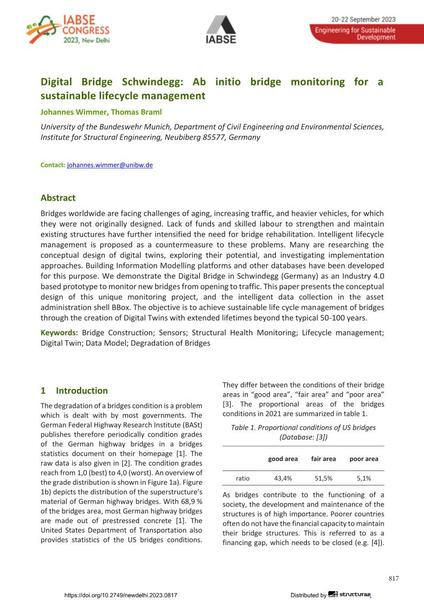Digital Bridge Schwindegg: Ab initio bridge monitoring for a sustainable lifecycle management

|
|
|||||||||||
Bibliografische Angaben
| Autor(en): |
Johannes Wimmer
(University of the Bundeswehr Munich, Department of Civil Engineering and Environmental Sciences, Institute for Structural Engineering, Neubiberg 85577, Germany)
Thomas Braml (University of the Bundeswehr Munich, Department of Civil Engineering and Environmental Sciences, Institute for Structural Engineering, Neubiberg 85577, Germany) |
||||
|---|---|---|---|---|---|
| Medium: | Tagungsbeitrag | ||||
| Sprache(n): | Englisch | ||||
| Tagung: | IABSE Congress: Engineering for Sustainable Development, New Delhi, India, 20-22 September 2023 | ||||
| Veröffentlicht in: | IABSE Congress New Delhi 2023 | ||||
|
|||||
| Seite(n): | 817-824 | ||||
| Anzahl der Seiten (im PDF): | 8 | ||||
| DOI: | 10.2749/newdelhi.2023.0817 | ||||
| Abstrakt: |
Bridges worldwide are facing challenges of aging, increasing traffic, and heavier vehicles, for which they were not originally designed. Lack of funds and skilled labour to strengthen and maintain existing structures have further intensified the need for bridge rehabilitation. Intelligent lifecycle management is proposed as a countermeasure to these problems. Many are researching the conceptual design of digital twins, exploring their potential, and investigating implementation approaches. Building Information Modelling platforms and other databases have been developed for this purpose. We demonstrate the Digital Bridge in Schwindegg (Germany) as an Industry 4.0 based prototype to monitor new bridges from opening to traffic. This paper presents the conceptual design of this unique monitoring project, and the intelligent data collection in the asset administration shell BBox. The objective is to achieve sustainable life cycle management of bridges through the creation of Digital Twins with extended lifetimes beyond the typical 50-100 years. |
||||
| Stichwörter: |
Brückenbau Sensoren
|
||||
